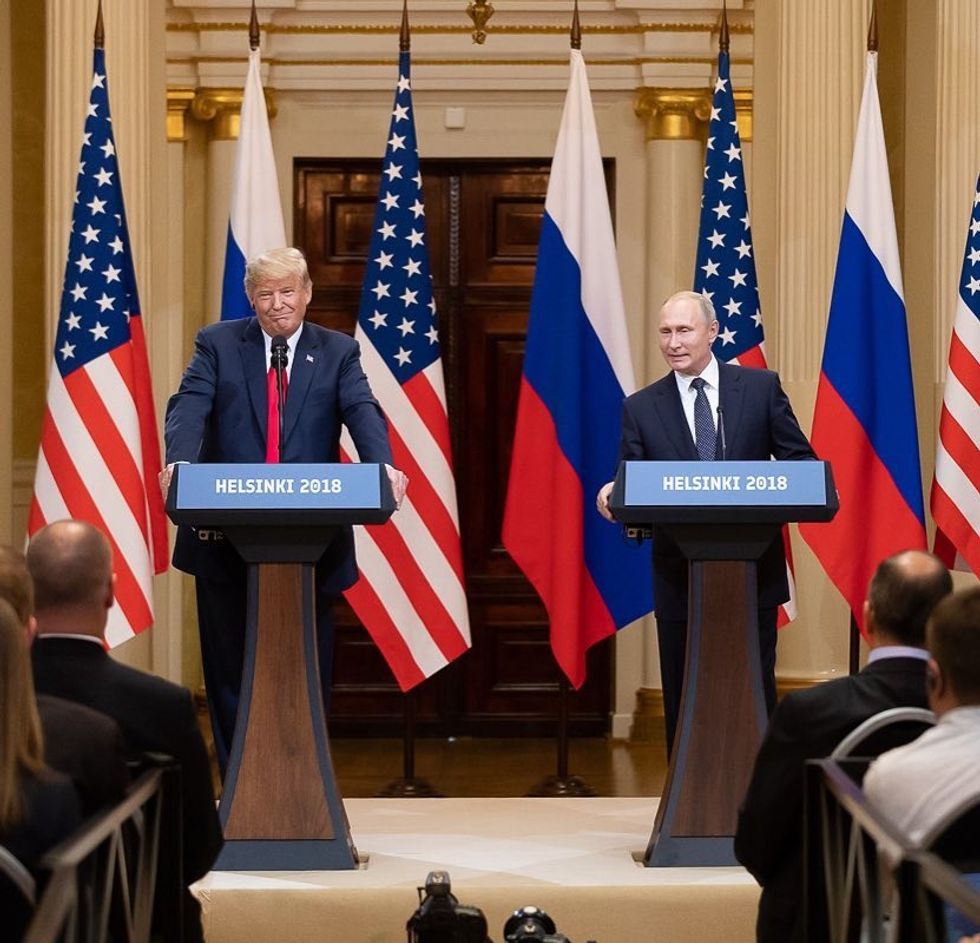Four months ago, I wrote an article that tackled the big geopolitics of the present day. In it, I talked about how while the United States had been increasingly preoccupied with the complications of military and diplomatic engagements in the Middle East for the last 20 years, old opponents in Russia and China have also become increasingly aggressive in their posturing on the world stage.
In that article, I specifically singled out the actions of the Russian and Chinese executives, Vladimir Putin and Xi Jinping respectively, for facilitating phony and coercive elections in order to consolidate and extend their power. I also criticized the Trump administration for its coziness towards Putin.
Now, four months later, I'm shocked but not surprised that Trump would stand side by side with Putin and denounce America's shortcomings in regard to Russia, while simultaneously praising his Slavic counterpart and tearing down the carefully crafted alliances the United States has built over decades and centuries with NATO, the European Union, and perhaps most of all, the United Kingdom.
I do not know what to make of this policy position other than that it is foolhardy. To speak more boldly, it is stupid.
President Trump would later issue a retraction of his statements from the summit, saying that he did in fact have faith in his intelligence community and that he no longer denied that Russia had meddled in the 2016 presidential election, although he maintained his assertion that there was no collusion between him and the Russians.
In short, hollow words from a hollow man.
President Trump could have issued that retraction or clarification or whatever you might call it while he was in Helsinki, while he was standing right next to Vladimir Putin. After all, he had no trouble ripping British Prime Minister Theresa May before he had even left the British Isles. Instead, in the case of Putin, Trump waited until he was safely back in the confines of Washington, D.C. to say or do anything.
Trump's comments drew the ire of party leaders on both sides, with everyone from House Speaker Paul Ryan (R-WI) to Senate Minority Leader Chuck Schumer (D-NY). Even the ailing Sen. John McCain (R-AZ), who hasn't sat in the Capitol Building for months as he battles brain cancer, saw fit to dismiss Trump's initial assertions about Russia as "one of the most disgraceful performances by an American president in memory."
I'm not all that uneager to agree with Sen. McCain.
Now, there will be those who say that past presidents had cozy relationships with Vladimir Putin too. This is not wholly inaccurate, though that does not mean presidents Clinton, Bush, and Obama were correct in how they dealt with the former KGB agent. After all, Republicans were amply and rightly critical of President Obama after he was overheard telling then Russian President Dmitri Medvedev (who has been accused of occupying a sort of "tandemocracy" with Putin) that he needed more space and flexibility in regard to Russian demands to delay/remove NATO-backed missiles from Europe until after the 2012 presidential election.
Essentially saying that he couldn't make any bargains (or worse, concessions) until after he was sure Mitt Romney had been neutralized as a political threat.
And yet, what Trump has done is much worse, if for no other reason than its brazenness and illogic. He has repeatedly said that there was no collusion between him and the Russian state in its attempts to subvert the 2016 election. If he is innocent, why does he protect the Russians so? Vladimir Putin and Donald Trump are not the same person, so what does it matter to the latter if Bob Mueller blasts the former to legal smithereens? Why does Trump feel the need to protect a man (and more broadly a state) that he says he has no relationship with outside of a working one?
My thought, for what that's worth, is that Trump is likely clean and clear of collusion, though perhaps not squeaky clean. Campaign manager Paul Manafort and former National Security Adviser Michael Flynn have already been indicted after all. Yet, I doubt that the special counsel will yet find a smoking gun with the President's name on it (though anything is possible).
While Trump admires the Russian leader's authoritarianism to a great extent (after all, the Donald is used to total and utter control) there is more to it than just that. What most of this seems to stem from is Trump's impatience with being questioned by former FBI Director Comey, which brought his ouster and the subsequent Mueller investigation, and an inability to differentiate claims about the election from claims about himself personally.
President Trump sees indications that the Russians influenced the 2016 election as attacks on the legitimacy of his winning, and admittedly how much clout Putin had in the lead up to the vote is doubtful. Still, Trump is not a man of nuance and admitting that there was any incongruity in the process, to him, would be a surrender.
Donald Trump does not know surrender. It's one of his best, and often times absolute worst, character traits.
There's no telling where the United States truly lies on the world stage anymore, with the executive of our government calling allies enemies and enemies allies. There is good reason to believe the United States has put itself in a bind, for the short-term future at the very least.
We can only pray that harsh and bumbling words alike don't have nearly the same net negative on American assets, interests, and investments in the days ahead.

















